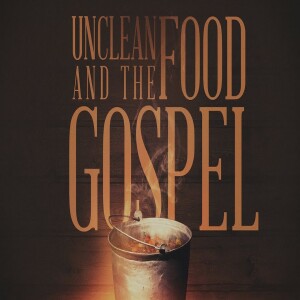

Unclean Food and the Gospel - Sabbath Service
Introduction
This Bible teaching from Founded in Truth Fellowship, delivered during a Sabbath service, explores the topic of clean and unclean foods as outlined in the Old Testament and their relevance in light of the Gospel of Jesus Christ. The speaker, likely Matthew Vander Els, guides the congregation through the historical context of these dietary laws, their significance for ancient Israel, and how they are understood by believers in Jesus today. The teaching emphasizes that while the community at Founded in Truth values and participates in many of these commandments, their primary focus is on the deeper spiritual lessons and the heart of the Gospel message.
The Torah's Dietary LawsThe teaching begins by referencing the Torah, specifically the books of Leviticus and Deuteronomy, which contain detailed instructions regarding which animals were considered clean and permissible for the Israelites to eat, and which were unclean and forbidden. Examples of unclean animals mentioned include pigs, whose meat and carcasses were not to be consumed or even touched. In contrast, animals living in the water were considered clean if they possessed both fins and scales. This detail is explored, noting that some creatures, like catfish and adult swordfish, would not have met these criteria. Certain birds, particularly birds of prey, were also listed as abhorrent and not to be eaten. Interestingly, the laws regarding insects made a distinction between those that fly and those that hop. Winged insects that walk on all fours were generally considered abhorrent, except for those with jointed legs above their feet for hopping, such as locusts, crickets, and grasshoppers, which were permitted.
The speaker explains that God gave these boundary laws to separate Israel from the surrounding nations, establishing them as a holy people. The concept of holiness (kedushah) is central, as God, being holy, expected His covenant people to reflect His likeness. The act of eating certain animals was presented as something that would distort this sense of holiness. While the community at Founded in Truth values the Torah and finds meaning in participating in these laws as an act of honoring God, it is clarified that this participation is not for salvational benefits or blessings, as blessings are understood to come to both the good and the wicked. Instead, they choose to engage with these commandments, like the Sabbath and the feast days, as a way to immerse their lives in the Word of God and connect with a rhythm of life based in Scripture. They believe these practices, including not eating certain meats, serve as a form of worship and a remembrance that God invites them to His table.
The New Testament Perspective: Mark 7The discussion then shifts to the New Testament and how Jesus addressed the concepts of clean and unclean. The Gospel of Mark chapter 7 is highlighted, where the Pharisees confront Jesus because His disciples did not wash their hands before eating. The Pharisees viewed this as a violation of their interpretation of the Torah, believing it made them unclean and defiled the community. However, Jesus rebukes them, stating that they have made the word of God ineffective through their traditions or interpretations.
Quoting Mark 7:14-23, Jesus teaches that nothing from outside a person can defile them. Rather, it is what comes out of a person's heart that defiles them, listing evil thoughts, sexual immorality, theft, murder, adultery, coveting, wickedness, deceit, sensuality, envy, slander, pride, and foolishness as the true sources of uncleanness. The speaker emphasizes that Jesus is reframing the understanding of purity, shifting the focus from external rituals to the internal state of the heart.
The New Testament Perspective: Acts 10Another key passage discussed is Acts chapter 10, which recounts the vision of Peter. In this vision, a large sheet filled with all kinds of animals, reptiles, and birds descends from heaven, and a voice commands Peter to kill and eat. Peter, being a faithful Jew, objects, stating that he has never eaten anything impure or unclean. The voice responds, "Do not call anything impure that God has made clean." This vision occurs three times before the sheet is taken back to heaven.
The speaker argues that this vision is not primarily about making all foods permissible to eat. Instead, it is interpreted as a symbolic message about the inclusion of Gentiles in the Gospel. Immediately after the vision, Peter is called to the house of Cornelius, a Gentile, which would have been considered ritually unclean for a Jew at that time. Peter's realization is that just as God declared these animals clean in the vision, He is also declaring that Gentiles are no longer to be considered unclean and are also invited into His kingdom.
Application for Everyday Life- Prioritize the condition of your heart over external actions when it comes to true righteousness.
- Practice humility and avoid haughtiness when observing religious practices.
- Extend grace and avoid judging those who do not adhere to the same religious convictions.
- Focus on producing the kingdom of God through love and service, rather than merely prescribing rules to others.
- Recognize that God's love and mercy extend to all whom He chooses, regardless of your personal preferences or judgments.
- View participation in biblical commandments as an act of worship and remembrance, not as a means of earning salvation.
- Engage in self-reflection to identify and address any bitterness, pride, or other negative traits in your heart.
- Focus on the weightier matters of the kingdom, such as love, justice, and mercy.
- Be mindful of how your zeal for religious dogma might lead to judging others who are not part of your covenant community.
- Extend generosity and service to others, even if their choices differ from your own.
For more Bible Teachings, visit our website.
References- Mark 2
- Mark 7
- Acts 10
- NIV Application Commentary on Deuteronomy by Daniel Block
- Interpretation Commentary Series on Leviticus by Daniel Block
Note: This article contains affiliate links.
More Episodes
All Episodes>>You may also like
Create Your Podcast In Minutes
- Full-featured podcast site
- Unlimited storage and bandwidth
- Comprehensive podcast stats
- Distribute to Apple Podcasts, Spotify, and more
- Make money with your podcast












